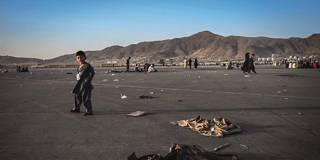In the Sino-American rivalry, the entire Indo-Pacific is in play. As countries across the region grapple with new great-power dynamics and the knock-on effects of America's withdrawal from Afghanistan, the only certainty is that security risks will remain a dominant concern.
NEW DELHI – In Asia today, the economy is global, politics are local, and security is local, regional, and transnational. The Taliban’s rapid return to power in Afghanistan reminded Asians that our security is interlinked. Likewise, the COVID-19 pandemic has raised the question of how to engineer an economic revival for the entire region.
That is not the end of the region’s challenges. Between the ongoing standoff on the India-China border, the tensions over Taiwan and the South China Sea, and the uncertain trajectory of Iran’s nuclear program, it is clear that Asia is now the epicenter of security risks.
The United States’ withdrawal from Afghanistan has forced together a coalition of regional powers – China, Russia, and Pakistan, with Iran’s acquiescence – to deal with the extremism and terrorism that the Taliban’s “Islamic Emirate” will nurture. Pakistan, the Taliban’s longtime patron, will try to prevent the “Talibanization” of its own politics, but radical Islamists within its borders have already been empowered and emboldened. China, Pakistan, Russia, and the Central Asian countries all face the prospect that homegrown separatists and extremists will find safe haven, weapons, and support in the new Taliban-controlled Afghanistan.

NEW DELHI – In Asia today, the economy is global, politics are local, and security is local, regional, and transnational. The Taliban’s rapid return to power in Afghanistan reminded Asians that our security is interlinked. Likewise, the COVID-19 pandemic has raised the question of how to engineer an economic revival for the entire region.
That is not the end of the region’s challenges. Between the ongoing standoff on the India-China border, the tensions over Taiwan and the South China Sea, and the uncertain trajectory of Iran’s nuclear program, it is clear that Asia is now the epicenter of security risks.
The United States’ withdrawal from Afghanistan has forced together a coalition of regional powers – China, Russia, and Pakistan, with Iran’s acquiescence – to deal with the extremism and terrorism that the Taliban’s “Islamic Emirate” will nurture. Pakistan, the Taliban’s longtime patron, will try to prevent the “Talibanization” of its own politics, but radical Islamists within its borders have already been empowered and emboldened. China, Pakistan, Russia, and the Central Asian countries all face the prospect that homegrown separatists and extremists will find safe haven, weapons, and support in the new Taliban-controlled Afghanistan.